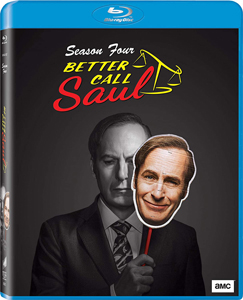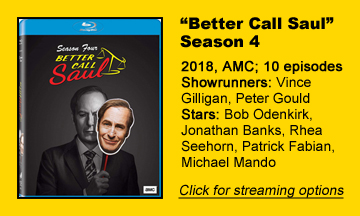With AMC’s “Breaking Bad” spinoff “Better Call Saul” set to air its sixth and final season later this year, we’re looking back at the first five seasons of Vince Gilligan’s second masterpiece series over five Thursdays. Next up is Season 4 (2018):
Digging into details
In “Breaking Bad,” methamphetamine magnate Gus Fring presents Walter White with a gorgeous, secret underground lab. If you had told me we’d later get the story of the construction of that lab in the prequel “Better Call Saul,” I would’ve said that’s overkill. While Vince Gilligan’s shows are all about the details of the illegal drug trade, we don’t need every detail, do we?
Yet the construction of this space under a laundry warehouse, as led by German engineer Werner (Rainer Bock), ends up being a prime example of what “BCS” – like “BrBa” before it – does so well: It shows that people can get monetarily rich at this game, but man do they pay for it in other ways.
The Season 4 finale, “Winner” (a reference to ABBA’s bittersweet “Winner Takes It All”), is the series’ best episode to this point.
Just when we think Mike (Jonathan Banks) can’t get in any deeper, he is forced to kill the sloppy-with-secrets Werner because Fring (Giancarlo Esposito) is going to have it done anyway. It’s an “Of Mice and Men” situation; Mike is friends with Werner, so he’s going to do him the service of being his killer.
Banks played nasty henchmen for decades in action movies, so it’s a fitting tribute to his talent at this type of role that “BCS” allows us to sympathize with Mike’s plight.
Jesse was (or will be, I should say) in a similar situation in “BrBa,” and links to that future-set show remain an appeal of “BCS”; genius physicist Gale (David Costabile) joins Fring’s team this season, for example. On the other hand, “BCS” has from the beginning had me thinking about the eventual fates of its previously unseen characters.
Kim in it for long haul
Now I think Kim (Rhea Seehorn) is it in for the long haul, because it will be more heartbreaking to see her dump Jimmy (the eminently watchable Bob Odenkirk) than to see her killed off.
And the Salamancas’ reluctant henchman Nacho (Michael Mando) has survived certain death so many times now that I suspect he might live forever. He’s not in “BrBa,” but that doesn’t mean he hasn’t fled somewhere, as Jimmy/Saul does at the end of “BrBa.”
A slight ding against Season 4 is that Jimmy is so darn likable that I find it hard to believe he’ll become a bad guy – even though I know he does. A midseason episode weirdly sneaks in a flash-forward to Saul and receptionist Francesca (Tina Lindy) frantically shredding papers and clearing out Saul’s office.
Showrunners Gilligan (who doesn’t write any episodes this season) and Peter Gould (who writes two) might’ve thought we needed a reminder that Jimmy is capable of slipping, and not merely back to Slippin’ Jimmy mode where he only runs scams against people who deserve it.

Saint among sinners
Before the finale, Jimmy is a saint among sinners this season, embarking on some of his most ingenious schemes to see good things happen within an unfair system. “BCS” almost gets headline-grabbing topical when the Albuquerque courts aim to prosecute Huell (Lavell Crawford) more strictly than is the norm, perhaps because he is black (although that’s never made overt).
So Jimmy drives to Louisiana, mails back faux letters of support from Huell’s hometown, and gets the case dropped. On a side note, I love how the trio of unnamed college students, eager for a quick buck, returns to pose as Huell’s supporters via phone – with the one played by Hayley Holmes now knowing how to act.
This overall scheme is devised by Kim, who – if we’re being honest – is a little inconsistent in the signals she sends to Jimmy about how deep she’s willing to go into illegal areas. The season finale, we learn Jimmy faked tears about his late brother Chuck (Michael McKean) in order to get reinstatement.
Seehorn’s performance and the receding camera present this as something Kim is shocked by. But it’s at least the 10th example of Jimmy doing something like this. Indeed, he’s initially rejected when he speaks from the heart; only on appeal, when giving the board what they want, is he reinstated.
Moving forward
It’s like Gilligan and his team are saying “We’ve all enjoyed Good Jimmy, but we have to move forward with the story.” Prequels often hit this hitch; see also “The Clone Wars’ ” numerous seasons of Anakin Skywalker being a hero. The fact that he later becomes Darth Vader is almost forgotten, as if it’s on a different timeline.
Also blunting Jimmy’s turning point (although I wouldn’t call it a point of no return yet) is that Mike’s story overshadows his in the finale. That’s a minor quibble, since Mike has always been a co-lead; one could even argue that this is a four-lead show with Kim and Nacho completing the quartet.
With characters this compelling and well-acted, “Better Call Saul” (and any shows in the “BrBa” universe that might follow) can dig into all the drug-trade minutiae it wants. That said, I’m glad to see the narrative convergence is coming and that the actors will get to show even more range in Season 5.
IMDb Top 250 trivia
- Not surprisingly, “Winner” (10) rates as the season’s best episode at 9.6. It’s loaded with tragedy for Mike, who commits outright murder for the first time, and Jimmy might possibly have gone too far this time in Kim’s eyes by using his late brother in his speech to get reinstated. Adding poignancy are the flashbacks to happier times between the McGill brothers. Painting the episode as a turning point: Jimmy announces he is changing his professional name to Saul Goodman.


